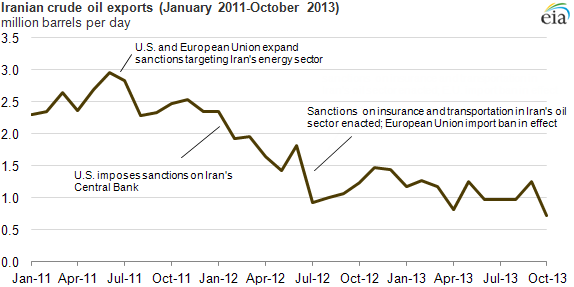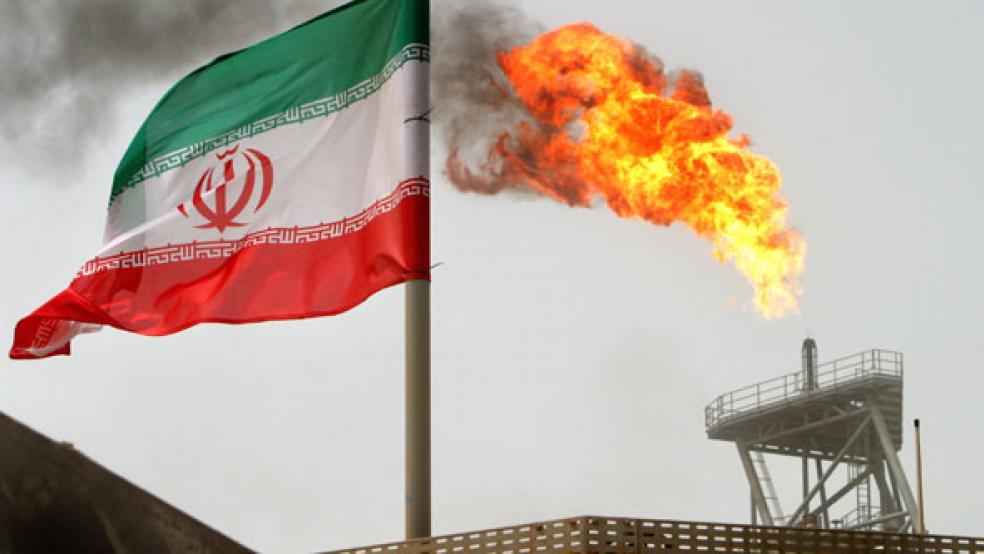Should we trust President Obama to conduct our foreign policy – a president whose international missteps are legion, who promises Russia “more flexibility” to deal with security issues like missile defense once reelected, and who wages war and orders retreat in the same breath? Consider the most recent rumblings about Iran.
For just a moment, it looked like President Obama had scored a rare diplomatic win. At considerable cost to itself, Saudi Arabia had arranged to drive down oil prices, a move that very much benefits the interests of the United States. Lower oil prices hurt Russia and Iran, our two biggest geopolitical antagonists. Lower oil revenues, like the sanctions now levied on both countries, undermine their economies and should enhance the bargaining power of the west.
Related: Iranian Caught Stealing Plans for DOD’s $1.5 Trillion Jet
Pundits suggest that the Saudis have kept their oil production high and driven prices down to preserve market share. In a long-term sense, that makes sense. One hundred dollar oil has allowed numerous players, including the U.S., to increase production. Sustained lower prices will cut output by marginal high-cost sources. Whether the Saudis will keep the lid on prices, and make such a long-term bet, however, remains to be seen. The idea that the U.S. might be coordinating with Riyadh in sending oil prices lower – given the Obama team’s lack of strategic diplomacy – has barely surfaced.
And rightly so. Astonishingly, Obama has scuttled any advantage lower oil prices might have delivered by hinting that (post-election, naturally), the president could use his executive authority to temporarily “suspend” the embargo on Iran oil output and other measures meant to force them to the negotiating table. His Treasury argues that such a move would not constitute a formal treaty, and therefore not require the approval of Congress. The leak of this plan has infuriated many on the Left and the Right, who realize that this accommodation of a desperate Iran would infuriate Israel, an ally that Obama continually ignores, and also insult Saudi Arabia, a necessary partner in brokering Middle East stability.
Any deal would be a one-way affair. Tehran has yet to agree to any significant slowdown in its efforts to become a nuclear nation. Indeed, western analysts count numerous attempts in recent years by Iran to achieve covertly what they have agreed to eliminate publicly. Why, then, would Obama risk alienating our few allies in the Middle East for an agreement that eludes the goals we have sought for so long?
Related: An Obama Failure with Iran Seems Inevitable
This is yet another legacy quest by President Obama. The New York Times, in reporting the prospective move, describes it as “the most important foreign policy deal of his presidency”. Indeed, it’s hard to find another. The country should not let Obama get away with this.
The danger of a nuclear Iran is a given. The UN Security Council has acknowledged as much by resolving that Iran must give up its uranium-enriching centrifuges. Today the country has 9,400 active centrifuges, and another 10,000 yet to start spinning. In a major concession, the six powers (U.S., France, China, Russia, Germany and Britain) negotiating a stop to Tehran’s ambitions have agreed that Iran may continue to operate 4,000 centrifuges.

In the latest round of talks, which ended mid-October, most participants reported virtually no progress. Nonetheless, the U.S. appears keen – along with Iran -- to strike a deal before the November 24 deadline. At a briefing, a State Department spokesperson said that the parties had made “progress incrementally,” which under questioning evolved into a “tiny” narrowing of differences, with large issues such as uranium enrichment – pretty much the core of the exercise – still outstanding.
Russia’s Foreign Minister Lavrov and Iranian President Rouhani have hinted that an extension of the talks might be beneficial. The U.S. wants no part of that; critics have noted that the termination date of the talks falls neatly between the midterm elections in the U.S. and the possible installation of a GOP-led Congress – a window that looms critical for a president looking to insert himself into the history books.
To be clear, Iran wants to see sanctions lifted, but also wants to be a nuclear power. Just before the most recent round of talks, Tehran again declined to answer questions from the International Atomic Energy Agency about suspected activities that could relate to the creation of a nuclear weapon. These were among several “practical measures” that Iran had pledged to resolve by the end of August 25, signaling its good-faith intention to cooperate with the IAEA. It was clear that its balk would stall the recent talks.
Related: Iran’s Trade Deals—Will the U.S. Miss the Boat?
To be even clearer, Iran has used a decade of stalling and pretense to advance its nuclear capabilities. According to a recent report from the non-partisan Iran Watch, “Iran now has the ability to enrich uranium to a grade suitable for use in nuclear reactors or to a higher grade suitable for use in nuclear warheads.” More specifically, “By using the approximately 9,000 first generation centrifuges operating at its Natanz Fuel Enrichment Plant, Iran could theoretically produce enough weapon-grade uranium to fuel a single nuclear warhead in about 1.7 months.” The report notes that Iran now has enough low-enriched uranium to build seven nuclear warheads.
No wonder Israel Prime Minister Benjamin Netanyahu has warned President Obama against accepting any deal that lifts sanctions without concessions from Tehran. No wonder 354 members of the House of Representatives sent Obama a letter warning that Iran’s lack of cooperation with the IAEA was a “bad omen” and that even members of his own party have threatened new sanctions.
Such warnings fall on deaf ears. In June 2009, President Obama invited nine presidential historians to dine at the White House, eager to learn what makes a great president. One admiringly described his host as not “bogged down in the details” of the job and plainly seeing “the opportunity to do big things;” he was impressed that Obama understood that "this is a major moment in the country's history."
How frustrated Obama must be. It turns out it’s the little things – the pesky details of managing the Secret Service, the IRS, the Veterans Administration and the CDC, the conducting of war and foreign policy, the schmoozing of Congress, leadership - that may build a legacy, even for someone ready to do “big things.”
Top Reads from The Fiscal Times:






